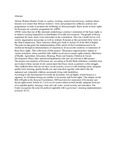Implementation of Article 43 of the Constitution of Kenya on Economic & Social Rights
Date
2013Author
African Women's Studies Centre
Type
PresentationLanguage
enMetadata
Show full item recordAbstract
African Women Studies Centre is a policy, training, research and advocacy institute whose
mission is to ensure that African women’s views and perspectives influence policies and
programmes in order to promote the wellbeing of African peoples. Basic needs as basic rights
for Kenyans are a priority programme for AWSC.
AWSC notes that one of the rationales underlying a country’s realization of the basic rights is
to address existing inequalities in distribution of wealth and resources. The people of Kenya
negotiated for basic needs to be entrenched in the constitution. This was a battle led by civil
society organisation and groups as well as ordinary Kenyans as they presented their views to
the Ghai Commission. Their collective effort gave birth to Article 43 of the Bill of Rights.
The policies that guide the implementation of this article of the Constitution need to be
reinforced through recommendations of experiences of successful countries in realization of
these basic rights. This is the focus of this project. The project targeted policy makers in
various ministries whose portfolio falls within social and economic rights namely: Ministries
of Health, Agriculture, Education, Housing, Water and Gender, Children & Social
Development. Many other ministries/departments who also are relevant to this project.
The project sees majority of Kenyans are, according to World Bank definition, constitute men
and women whose income levels cannot meet their basic needs as partners in this struggle.
They included those who do not have social security, access to safe drinking water, adequate
quality food, housing, quality health care and education together with others like the
orphaned and vulnerable children and people living with disabilities.
According to the International Covenant on Economic, Social Rights, which Kenya is a
signatory to; all human beings are entitled to Economic and Social rights. The chapter on the
Bill of Rights in the Kenyan Constitution, 2010 provides for enjoyment of Economic and
Social rights under Article 43 1 (a-f) on six sectors which include health, adequate food and
of acceptable quality, housing, clean and safe water, social security and education. The
Centre recognizes the need for political equitable will in governors’ ensuring implementation
of article 43 (1).
Publisher
University of Nairobi African Women's Studies Centre

